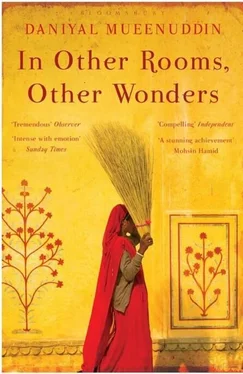The big man brandished what looked like the sole of an enormous shoe, with writing on one side in thick black script. ‘See what this says? It says, “Sweetheart, where did you sleep last night?” Understand?’
Without warning, he swung.
Rezak shrieked, a startled high-pitched sound. He never had felt pain like this, which spread flickering all through his body.
Another policeman came into the room when Rezak screamed and stood by the door, watching, with a grin on his face.
‘Come here,’ said the big man. ‘You do it, since you’re so interested. You need the practice, anyway.’
Of course he could tell them nothing. ‘I don’t know,’ he sobbed. ‘She’s gone, I don’t know anything.’ After a few strokes he fell into a rhythm, shrieking when they hit him, then when they stopped groaning, ‘O my God, O my God, O my God …’
After beating Rezak for five or six minutes, they threw him into a storeroom.
The D.S.P. stopped at the Tret post on his way down to Islamabad from Murree. The big man stood up and casually saluted when the officer walked in. They shook hands.
‘What’s going on? Anything new?’
‘Call from Awaz Khan Sahib. He keeps asking why we haven’t picked up those two clowns from Mariani.’
They discussed this, something to do with a road contractor, villagers blocking the line of a new road — they needed to be shown the stick.
As he started to leave, the D.S.P. asked, ‘What about that missing girl?’
‘Someone driving by must have seen her and snatched her. The Chandias say they didn’t do it.’
Only the Chandias, the most powerful of the gangster clans in the area, would have presumed to abduct a woman without cutting in the police.
‘And we pulled in the husband and worked on him. He’s clean.’
The D.S.P. made a face. ‘You didn’t! This is some American woman’s pet servant. Tell me you didn’t do anything severe.’
‘He’s fine, he’s fine. Do you want to see him?’
‘No. You’re positive, right?’
‘I’m definitely positive.’
‘No marks?’
‘Well, sir, no visible marks. I have to work somewhere.’
The D.S.P. laughed. ‘I suppose you do.’
After thinking for a moment, he said, ‘I’ll have to go see Bukhari Sahib and explain that she’s disappeared off the face of the earth. It’s a good idea to put in an appearance there anyway.’
‘What about the old man?’
‘Dump him at home and tell him he’d better keep his mouth shut.’
Shortly before dawn, almost tenderly now, they bundled Rezak into the same unmarked car and sneaked him back into his hut.
‘You’ve tasted it once. Don’t make us dose you again. Not a word to anyone — do you understand?’
Rezak stared at his feet. Finally, he nodded his head.
He lay all that day without sleeping, into the dusk, then the dark. His buttocks had swollen up, puffy and white like bread dough, so that he had to lie on his stomach. His mind whirled — without touching on any one thing for more than a moment, the wife he married when almost still a boy, who died so many years ago, then his second wife, the little mentally disturbed girl. His stepbrothers, who took his land, the fruit trees in the garden there in Kashmir and the fruit trees here, brought from America. His things, his television, the day he went to the store and bought the bright red plastic television.
‘Why should I complain? The policemen did as they always do. The fault is mine, who married in old age, with one foot in the grave. God gave me so much more than I deserved, when I expected nothing at all.’
He made sure to be perfectly silent about what had happened.
After he recovered, he was left with one last wish. In Rezak’s mind good fortune and grace were wound together, so that the Harouni family’s connections and wealth established not simply the power of the household but also its virtue. Ghulam Rasool had served the Harounis for more than fifty years, some of the other retainers had served almost as long. He could never equal that service. But nevertheless the family took him in when otherwise he might have begged in the streets. They gave him the money to live beyond his station, they made him hope — for too much. And when he lost the girl, their instruments punished him for having dared to reach so high, for owning something that would excite envy, that placed him in the way of beatings and the police. Now he belonged to the Harounis. This was how he understood justice.
He said to Ghulam Rasool, ‘I beg you, ask our master to bury me here on this land, in one corner, whichever one he likes.’
This became his dream and his consolation. He lived on for another year, then six months more, collecting his salary, never spending a rupee more than was sufficient to keep his body warm. He sold the television, sold the goats. At the end of eighteen months, he went up to Murree, to the stonecutter, and said that he wanted the very best gravestone in the shop, and carved marble to sheathe the rest of the grave.
After his night in the police station Rezak walked gingerly and made grunting noises under his breath — everyone remarked on how he had changed after his wife disappeared. The stonecutter, seeing his bent trembling figure, thought, This old bird doesn’t know what good marble costs.
But Rezak took out a roll of bills, tied in a greasy handkerchief that he pulled from under his shirt. Blue notes, thousands.
‘Well, that’s different,’ said the stonecutter, taking Rezak’s hand and leading him into the back room. ‘Look at this piece, now. Look at the color, the grain. Look at the size of that. I swear to God, I’ve been saving it for my own mother.’
No one had seen the old man for several days, and the gardener sent to inquire rattled and knocked and then found him dead in the little cubicle. Ghulam Rasool had the gardeners dig a grave along the wall of the property, and that evening they buried him, just a few people attending the janaza, the servants from the big house, a few men from the bazaar and from houses on the hillside next to the Ali Khan lands. A poor man from nearby had been paid to wash the body, the maulvi from the mosque in the bazaar said the prayer.
The next Friday, Sonya came up from Islamabad at nightfall, bringing just her young son and his ayah . Ghulam Rasool, dropping a pill of sweetener into a cup of tea said, ‘I beg your pardon, Madam. The old man Rezak, whom you so kindly put in charge at the Ali Khan lands, has passed away.’
The electricity had failed, as it often did up on the mountain. At dusk, by candlelight, the tall rooms of the stone-built house were solemn and chilled, like an empty church or a school when the children are gone.
‘Poor poor thing. All alone, and his wife disappeared.’
At moments, as now, she felt closer to Ghulam Rasool than to anyone else in Pakistan, his large dark compassionate face, heavy body, his shrewd and yet ponderous manner, his orthodox unshakable beliefs.
He was silent for a moment, then continued, ‘Please forgive me, but I took the liberty of having him buried in the Ali Khan orchard. He had asked me to speak with you.’
Still not touching her tea, looking up at him as he stood with his hands crossed on his belly, she said gently, ‘I’m so glad you did, Ghulam Rasool. Of course Mian Sahib and I would want that.’
The old servant had come far by knowing the ways of his masters. Saying no more nor less than this, he withdrew quietly, leaving Sonya musing by the fire on having done the right thing for a lonely old man, having done a little bit for the good.
The next morning, slipping out of the house, Sonya took Ghulam Rasool and a single gardener and walked up to the Ali Khan lands. The smallness of the grave surprised her, the mound decorated with tinsel in advance of her visit, the marble stones he had bought stacked beside it. Ghulam Rasool and the gardener said the fatiyah, holding their upturned palms in front of them and silently reciting a prayer, and Sonya stood also with her hands upturned and eyes closed, thinking first of the old man, a life drawn to a close with so little fanfare, and then of her own dead, her father and mother lying under the snow in a Wisconsin graveyard.
Читать дальше












